LED RGB Strip - Addressable, 1m (APA102)
These are addressable 1-meter-long 5V RGB LED strips that come packed with 60 APA102Cs. APA102 LEDs are very similar to WS2812s with a few caveats: APA102s can be controlled with a standard SPI interface, and they have an extremely high PWM frequency. There is access to each APA102 LED, and each strip length can be easily modified. You will be able to control each LED RGB individually, giving you the ability to create cool lighting effects for your car or perhaps under-cabinet lighting in your kitchen!
Note: These come in 1m segments on a reel. They are preterminated with 0.1" spaced 4-pin connectors, as shown in the pictures.
LED RGB Strip - Addressable, 1m (APA102) Product Help and Resources
TeensyView Hookup Guide
March 16, 2017
A guide to using the TeensyView OLED board to display text and graphics.
Mean Well LED Switching Power Supply Hookup Guide
June 28, 2018
In this tutorial, we will be connecting a Mean Well LED switching power supply to an addressable LED strip controlled by an Arduino.
LumiDrive Hookup Guide
January 17, 2019
The LumiDrive LED Driver is SparkFun’s foray into all things Python on micro-controllers. With the SparkFun LumiDrive you will be able to control and personalize a whole strand of APA102s directly from the board itself.
APA102 Addressable LED Hookup Guide
October 8, 2019
Connect, power, and control your APA102 addressable LED strip!
1 of 1 found this helpful:
Resources and Going Further
Try checking out our Lumenati Hookup Guide that uses the APA102-based LEDs. There is an Arduino and Raspberry Pi example.
Core Skill: Programming
If a board needs code or communicates somehow, you're going to need to know how to program or interface with it. The programming skill is all about communication and code.
Skill Level: Rookie - You will need a better fundamental understand of what code is, and how it works. You will be using beginner-level software and development tools like Arduino. You will be dealing directly with code, but numerous examples and libraries are available. Sensors or shields will communicate with serial or TTL.
See all skill levels
Core Skill: Electrical Prototyping
If it requires power, you need to know how much, what all the pins do, and how to hook it up. You may need to reference datasheets, schematics, and know the ins and outs of electronics.
Skill Level: Competent - You will be required to reference a datasheet or schematic to know how to use a component. Your knowledge of a datasheet will only require basic features like power requirements, pinouts, or communications type. Also, you may need a power supply that?s greater than 12V or more than 1A worth of current.
See all skill levels
Comments
Looking for answers to technical questions?
We welcome your comments and suggestions below. However, if you are looking for solutions to technical questions please see our Technical Assistance page.
Customer Reviews
4.5 out of 5
Based on 2 ratings:
1 of 1 found this helpful:
LED 60 RGB addressable strip - Great product
This is a well made and easy to use product. The inclusion of the connectors and 5 volt taps at each end make it easy to connect. This strip works perfectly with either the Adafruit dotstar library, or the FastLED library. I am using it to illuminate a small train layout diorama. It is perfect for simulating sunrise, sunset, lightning and anything else you can think of. Enjoy!
No problems
I used a picaxe to drive it, worked great.

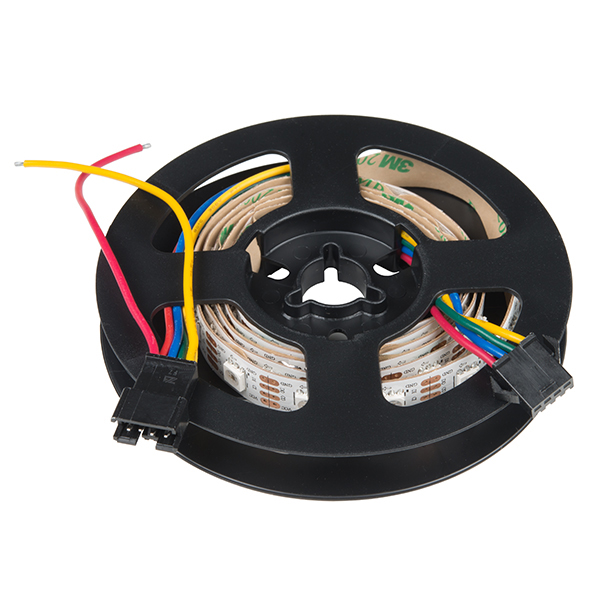
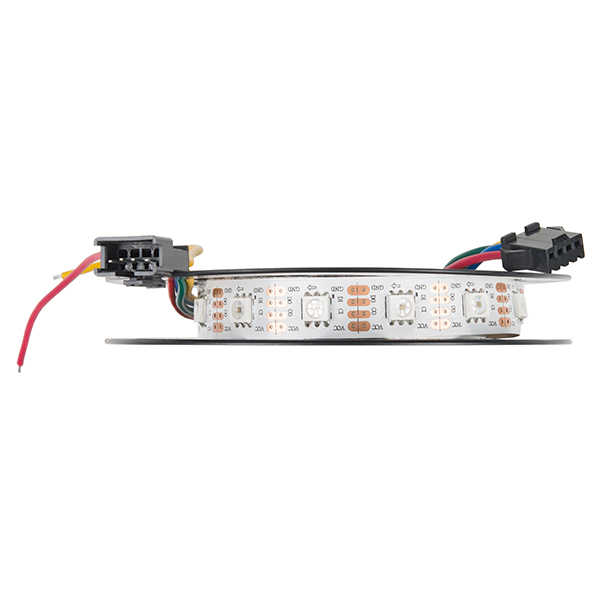
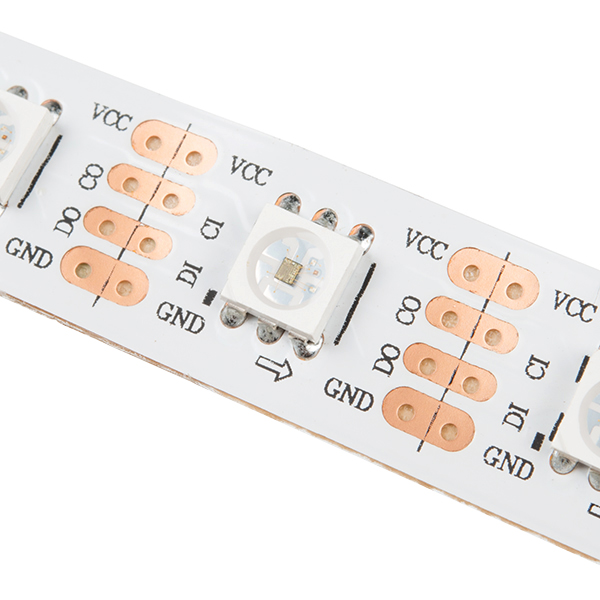
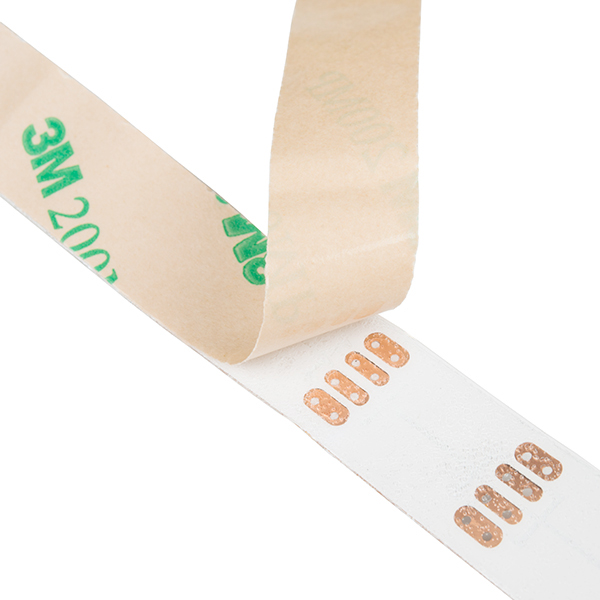
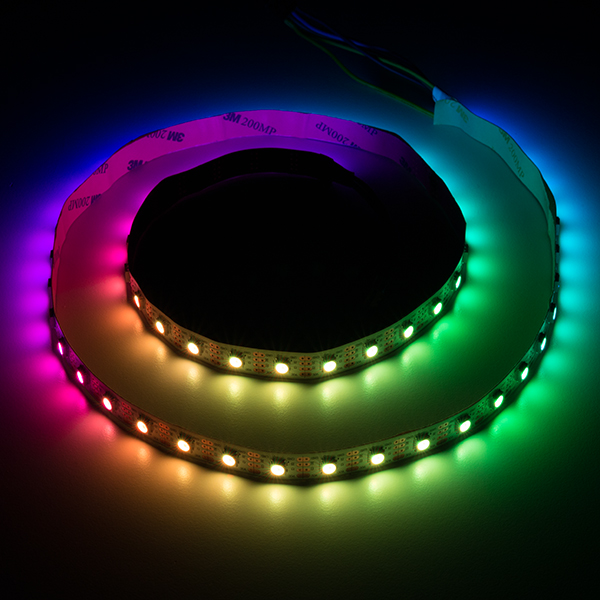
This is probably a really silly question, but what are the extra two wires on one end of the strip for?
From the datasheet, the expose the 5V and GND connections. This is useful for injecting power on longer connections of strips, as the current supply falls off.
the Arduino and RPi libraries are great for it...but i'd like try APA107 or the NS107S... https://datasheetspdf.com/pdf/1311758/NEWSTAR/NS107S/1
APA102 APA102C APA105 APA107 are great to work with, they work on 5V so each meter consumes around 18W or 3.5A, i know one factory named NEWSTAR can make 12V pixel led strip with 1LED/1IC, link: newstar-ledstrip.com
It worked out of the box on a Raspberry Pi. I like it.
APA102 are great to work with. Only problem I found is that they work on 5V so each meter consumes around 18W or 3.5A. if you want a long chain you must add a thick cable for the power as the strip itself can't carry so many amps without a large voltage drop. They should make these strips work on 24V or even 48V.
It should be normal practice, when offering a product with connectors, to either stock the mates or provide a link to a source or at least an industry part number. I can't use this without the mating connectors, delaying a purchase from you.
is there a recommended JST 4 pin connector with flying leads assembly that will connect to the input side of this ?
Are there Arduino and RPi libraries for these? If so, where can they be found?
The FastLED library works really well.